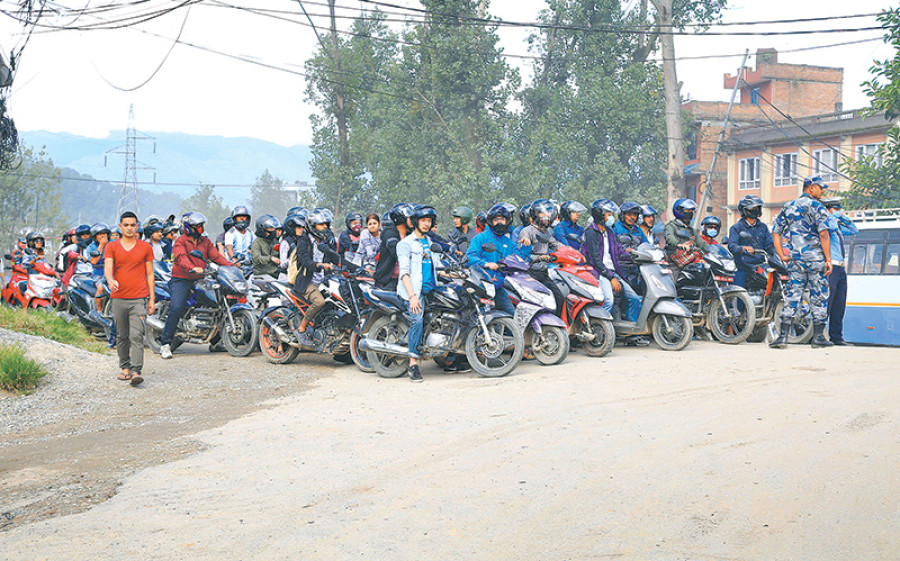National
Drivers end strike after deal
The nationwide strike of drivers, against provisions of the recently introduced Civil Code, was called off on Friday after an eight-point agreement with the government.
Chandan Kumar Mandal
The nationwide strike of drivers, against provisions of the recently introduced Civil Code, was called off on Friday after an eight-point agreement with the government.
Protesting new amendments to the Motor Vehicle and Transport Management Act-2049 BS, the drivers had been obstructing public transport movement in different parts of the country, hitting general life and disrupting essential supplies.
New provisions were introduced as part of the Amendment to ‘Some Nepal Acts’ to make the law compatible with the recently passed Criminal Code.
As per the amended provision of the Criminal Code, a driver may be sentenced to 3 to 10 years in case of death in a road accident.
Earlier, the minimum jail term was two years, which could go up to 10 years. Additionally, the new amendment also slapped a fine of Rs30,000 to Rs100,000 in cases of death in road accidents.
Kedar Bahadur Adhikari, secretary at the Prime Minister’s Office, told the Post that the situation should normalise after the agreement.
“Their main concern was the increased minimum jail penalty of three years from two,” said Adhikari. Both the parties agreed to necessary legal amendments after coordination between the Ministry of Physical Infrastructure and Transport and the Ministry of Law, Justice and Parliamentary Affairs. The team will also have a representative of drivers.
Among other agreements, the Transport ministry will manage traffic signs, regularly maintain roads and arrange parking spaces along national highways for long-route vehicles. The Department of Transport Management (DoTM) will also conduct regular Vehicle Fitness Tests. Drivers detained during the strike will be released immediately.
The impact of the strike was felt in the Capital and other major cities across the country, especially after tanker drivers joined the protest, which disrupted fuel supply.
An artificial shortage was created in Rautahat, where most fuel stations remained shut or refrained from selling fuel. Petrol, however, was sold in the black market for Rs150 a litre in different parts of the district.
Fuel shortage was witnessed also in Birgunj, the gateway for the country’s 70 percent fuel imports. However, imports in the western region remained normal and unaffected by the strike.
Citing the disruption in fuel supplies and panic fuelling in the Capital since Thursday morning, Nepal Oil Corporation, on Friday, requested the public to maintain calm while assuring sufficient stocks in its depot.
The corporation also announced distribution limit of 5 litres for two-wheelers, 15 litres for light four-wheelers, 50 litres for short-route diesel-run vehicles and 100 litres for long-route vehicles.
The corporation also asked fuel dealers to prioritise ambulances, school buses and government vehicles during distribution.
“We have sufficient stock. The ‘shortage’ is due to the strike. The corporation even mulled deploying its own drivers to resume fuel supply,” NOC Spokesperson Birendra Goit told the Post, adding that the movement of tankers from the Thankot depot resumed on Friday afternoon.
“We are also considering having our own pool of tankers and drivers so that supply is never disrupted in the future and this can be arranged within months. We also have plans for additional storage depots but this will take time,” he added.
Admitting the disruption in supplies, the Corporation’s Bhalwari Regional Office chief Ashok Shah clarified that there was no scarcity. Preparations were under way to send 15 tankers of petrol and 25 tankers of diesel to Kathmandu.
“We have been importing enough fuel to meet the demand. There is no shortage. The internal distribution system has been affected due to the strike,” he said.
According to the Corporation’s Birgunj Office chief Jagadish Chandra Yadav, fuel loading had been disrupted since Sunday.
“On a normal day, 180 tankers carry back petrol and diesel from Raxaul depot. On Friday, only 11 tankers were loaded but following the agreement, regular loading of fuel from Raxaul depot will resume,” said Yadav.
According to DoTM Spokesperson Gokarna Prasad Upadhyaya, the strike affected vehicular movement and full-fledged advanced booking for Dashain, which is already delayed due to the demands of the Federation of Nepalese National transport Entrepreneurs Association.
(Local correspondents contributed to this report.)




 9.89°C Kathmandu
9.89°C Kathmandu














